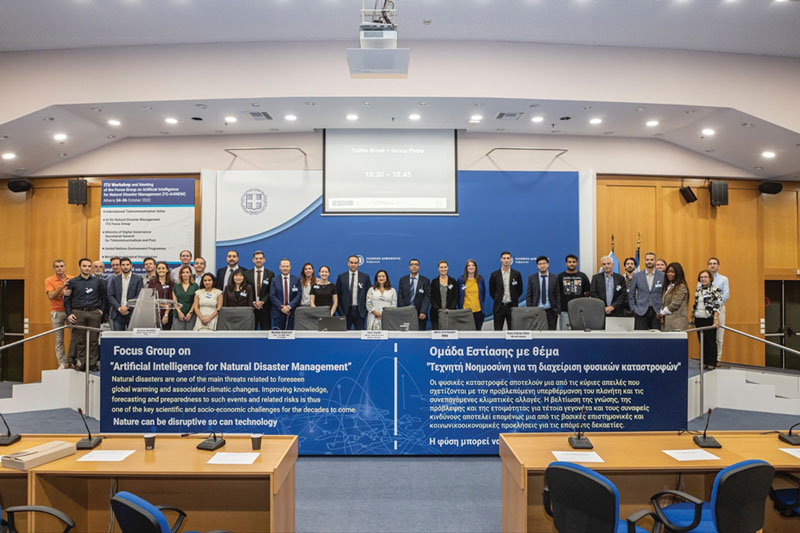by Monique Kuglitsch and Eri Stern (Fraunhofer Institute for Telecommunications, Heinrich-Hertz-Institut, HHI)
The Focus Group on AI for Natural Disaster Management was created to address the growing interest in using novel artificial intelligence (AI) methods to manage natural disasters. The Focus Group is tasked with analysing use cases, consulting with experts and reviewing scientific literature to produce standards, with an emphasis on stakeholder and end user involvement, as well as initiating capacity-building activities such as hackathons, hands-on training sessions and workshops.
Climate change is projected to impact the frequency, magnitude, location and timing of extreme weather events. To manage these hazards (and others), a comprehensive approach is needed, which combines communications technologies (e.g. early warning systems, decision support systems) with other adaptation measures (e.g. nature-based solutions, infrastructure improvements). To facilitate this transition on a global scale, the UN’s Early Warnings for All (EW4ALL) initiative is closing the gaps in early warning system coverage to protect everyone on Earth by 2027 [L1]. In parallel, the UNFCCC, UNDP, and UNEP (and others) are promoting the development and implementation of adaptation measures.
One tool that shows tremendous promise in managing these hazards is AI. Through digesting data (e.g. from satellite imagery, social media feeds and sensor networks) that describe the environment (and changes therein), AI has been able to outperform (in terms of speed and accuracy) many conventional models. Thus, AI presents a paradigm shift for monitoring the environment and managing natural hazards effectively, and will only become more important as the climate changes.
However, AI is nonetheless a relatively new technology with limitations and pitfalls [1]. Some open questions include: Which data are suitable for AI [2]? What legal and ethical frameworks apply when using AI? To what extent can the robustness of AI be determined? What safeguards should be in place in case AI does not perform as expected? How can AI best contribute to the EW4ALL?
To address these questions and more, the ITU/WMO/UNEP Focus Group on AI for Natural Disaster Management (FG-AI4NDM) was created in 2021 [L2]. Bringing together experts from many disciplines and fields (including experts from the EC JRC, ECMWF, and ESA), the focus group is analysing use cases, consulting with experts and reviewing scientific literature to produce standards. One key aspect emphasised by FG-AI4NDM is the involvement of stakeholders and end users in the development of AI-based algorithms to bridge the gap that too often exists between the experts that develop such algorithms, and the users for whom they are developed [3]. This ensures the appropriate and effective adoption of AI-based algorithms.
In parallel to developing standards, the focus group has contributed to capacity-sharing activities including hackathons, hands-on training sessions and workshops (e.g. the ITU Webinar on “Fighting wildfires with AI-powered insights” held virtually in April 2023).

Figure 1: Focus group experts convened in Athens, Greece.
With three standards already being evaluated by the member states at the ITU and two nearing completion, the focus group is planning a transition into a global initiative, which will occur in March 2024. The initiative will continue to advance on standards while delving into implementation projects that contribute directly to the EW4ALL and adaptation activities.
Links:
[L1] https://public.wmo.int/en/earlywarningsforall
[L2] https://tinyurl.com/yc55f87z
References:
[1] M. Kuglitsch, A. Albayrak, R. Aquino, et al., “Artificial intelligence for disaster risk reduction: opportunities, challenges, and prospects”, WMO Bulletin, vol. 71, no. 1, Mar. 2022. [Online]. Available: https://public.wmo.int/en/resources/bulletin/artificial-intelligence-disaster-risk-reduction-opportunities-challenges-and.
[2] M. Kuglitsch, A. Albayrak, J. Luterbacher, et al., “When it comes to Earth observations in AI for disaster risk reduction, is it feast or famine? A topical review”, Environmental Research Letters, Accepted, September 2023. doi: 10.1088/1748-9326/acf601.
[3] M. Kuglitsch, I. Pelivan, S. Ceola, et al., “Facilitating adoption of AI in natural disaster management through collaboration”, Nature Communications, vol. 13, no. 1, March 2022. doi: 10.1038/s41467-022-29285-6.
Please contact:
Monique Kuglitsch, Fraunhofer Institute for Telecommunications, Heinrich-Hertz-Institut, HHI, Germany










